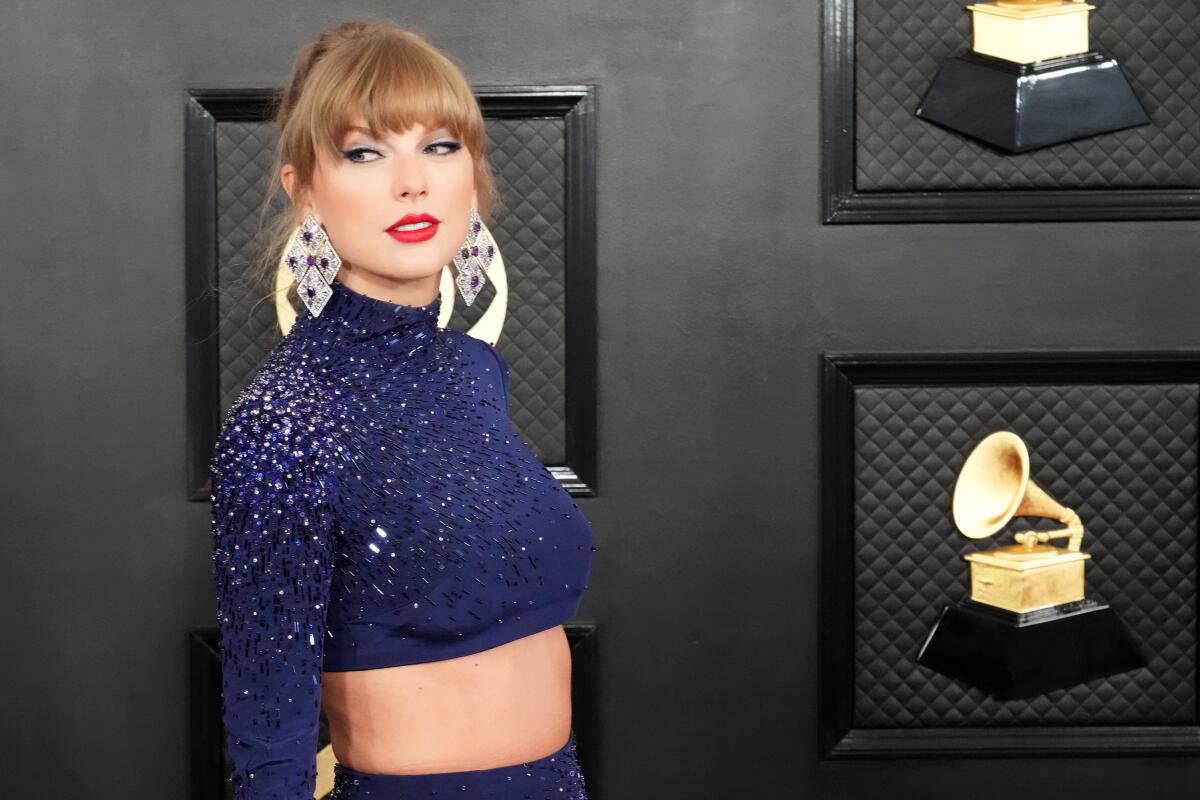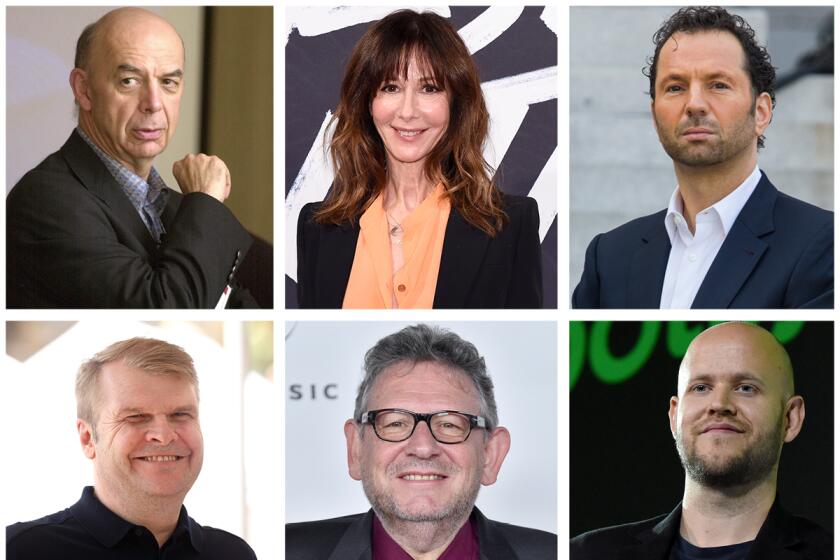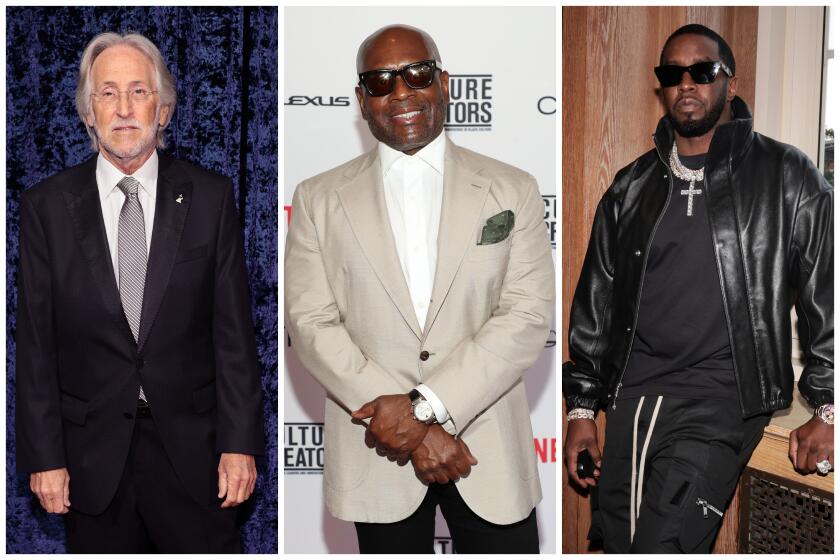It might be Taylor Swift’s year at the Grammys, but it’s not the ‘year of the woman’

- Share via
Taylor Swift, SZA, Billie Eilish, Olivia Rodrigo … with so many female performers nominated for so many Grammys, will this be the “year of the woman” in the music industry?
The data say no: We are still far from parity, so that claim would be too ambitious. But there’s finally a trend in the right direction.
USC’s Annenberg Inclusion Initiative found that across 70 top music companies, there were only three Black top executives and two women of color.
One of the most glaring gaps is in songwriting, according to the latest analysis from the USC Annenberg Inclusion Initiative. Only 19.5% of all songwriters across the Billboard Hot 100 songs in 2023 were women. This is a welcome change compared with 2022 (14.1%) or 2012 (11%) but still wildly inadequate when one considers that half the audience identifies as female.
Songwriting is an area in which women’s representation could improve drastically and quickly. All that’s needed is a commitment from the industry to add women in that role.
We hear excuses often about why representation can’t happen quickly. Some in the industry say “women have to be really good” — and yet mediocrity among men is acceptable. Others resist bringing women into the writing process by saying “you can’t interfere with an artist” or “talent are superstitious about who they work with and how.”
These kinds of rationalizations aren’t new. We have heard them in every entertainment space. There are similar negative myths about female directors, female showrunners and female cinematographers. The folklore about women in these roles serves only the gatekeepers who want to restrict women’s access and opportunity while men remain unfettered.
Alexa Nikolas, founder of activist group Eat Predators, on the ‘miracle’ of Cassie’s lawsuit against Sean ‘Diddy’ Combs and the challenges still facing abuse survivors.
In film and television, those myths are shattered by one revealing fact: If you have women at the helm of a project, other women are more likely to participate on screen and in other key behind-the-scenes positions. We assumed that music would be no different.
Across last year’s 100 top songs, only 14 featured a female artist with a nonperforming female songwriter. A full 25 songs had a female artist and no nonperforming female songwriter attached, countering our assumption about women advocating for other women.
USC’s Annenberg Inclusion Initiative found that across 70 top music companies, there were only three Black top executives and two women of color.
Hit songs often are written by teams and list many writers. For these 25 songs, the average number of writers was three, but some included as many as 11 — all men. What gives? Female artists work with men but not women? This is not a good look in 2024. But all is not lost. The rising power of female performers should allow these artists and others to wrest significant power from the 75% of talent-scouting executives who are men.
Imagine what the headliners of the industry could do for representation if they make it a priority. We’ve calculated that if the top female performers each “just add two” female songwriters to their hit songs per year, we would reach gender parity in only four years. This would be a modest change for the performers with major implications for the industry.
The “just add two” approach would create jobs for female songwriters in addition to the jobs that men already hold. Because they would be working with a female performer, women shouldn’t be tokenized in writing sessions even if most of the other songwriters were men. Bringing in female writers would also expand access to top talent that only men have had in the past. And more women in the industry could work toward career sustainability.
Managers can be key to this transition. Often all that’s required is asking the performer to collaborate with a woman and then facilitating that collaboration by putting it on the schedule. Artists such as John Legend, Charlie Puth and the National have always been more than willing to work with women. Alanis Morissette has made it a priority to do so. The manager’s job is to ensure that the good intentions come to fruition.
Hiring is a choice, and female artists who routinely find themselves on the top charts could decide to make a change — not only in the lives of female songwriters but also in the culture at large. Nearly 25% of the 1,200 most popular songs of the last 12 years were penned primarily by 12 men. Those 12 men are shaping audience perceptions and beliefs about romance, relationships, wealth, health and any number of other topics.
One day soon, we would love to celebrate the “year of the woman” in the music industry. Top performers can get us there with a simple act: just add two.
Stacy L. Smith is a professor at USC in the Annenberg School for Communication and the School of Dramatic Arts, and founder of the Annenberg Inclusion Initiative. Ty Stiklorius is the founder and chief executive of Friends at Work, a management and entertainment company.
More to Read
A cure for the common opinion
Get thought-provoking perspectives with our weekly newsletter.
You may occasionally receive promotional content from the Los Angeles Times.











